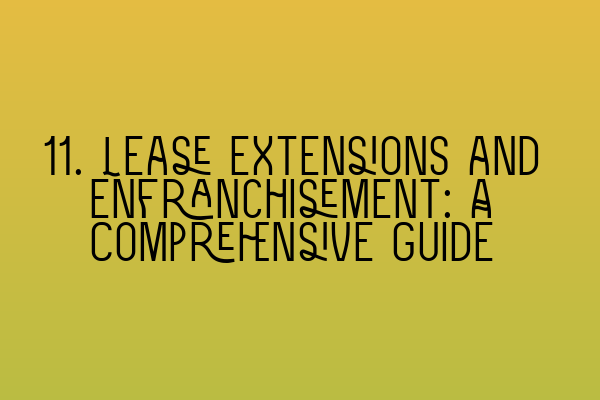Lease Extensions and Enfranchisement: A Comprehensive Guide
Lease extensions and enfranchisement are important aspects of property law that every homeowner and tenant should be familiar with. Whether you are a landlord, tenant, or a property investor, understanding the rights and procedures related to lease extensions and enfranchisement can help you make informed decisions and protect your interests.
1. What is a Lease Extension?
A lease extension is a legal process that allows a tenant to extend the length of their lease contract. When a lease starts to run out, the value of the property decreases, and the tenant’s rights may be at risk. By extending the lease, tenants can secure their long-term occupation and investment in the property.
However, the process of lease extension can be complex and involve negotiations with the landlord or freeholder. It is crucial to seek professional advice from a solicitor specializing in property law to ensure your rights are protected.
2. Who is Eligible for a Lease Extension?
Leaseholders who have owned the property for at least two years are generally eligible to apply for a lease extension. However, certain criteria must be met, and the specific requirements may vary depending on the type of property and the terms of the lease. Consulting a property law expert will help you determine if you qualify for a lease extension.
3. How to Start the Lease Extension Process?
The lease extension process begins with a formal notice served on the landlord, known as a Section 42 notice. This notice sets out the tenant’s intention to extend the lease and initiates negotiations with the landlord regarding the terms and premium payable.
It is crucial to ensure the Section 42 notice is prepared correctly and served within the required timeframes. Failure to comply with the legal requirements can result in delays, disputes, and potentially lost rights. Seeking the guidance of a property law solicitor will help you navigate through the process smoothly.
4. Negotiating the Terms and Premium
Once the Section 42 notice is served, negotiations begin between the tenant and the landlord to determine the terms and premium of the lease extension. The terms may include the length of the extended lease, ground rent, maintenance responsibilities, and other pertinent matters.
The premium, which is the price to be paid for the lease extension, can be a contentious issue. It is essential to obtain a professional valuation of the property to ensure a fair premium is agreed upon. A property law solicitor can guide you through the negotiation process and ensure your interests are protected.
5. Leasehold Enfranchisement
In addition to lease extensions, leaseholders may also have the right to enfranchise, which allows them to collectively purchase the freehold of their building. Leasehold enfranchisement is particularly relevant for leaseholders in flats or properties with multiple units.
This process provides leaseholders with more control over their property and the opportunity to take charge of the building’s management, maintenance, and service charges. Enfranchisement can also increase the value of the property and offers greater security for long-term occupants.
6. Seeking Professional Legal Advice
Lease extensions and enfranchisement are complex legal processes that require expert knowledge of property law. Navigating these procedures without professional guidance can lead to costly mistakes and potential disputes.
At SQE Property Law & Land Law, we specialize in providing comprehensive legal support and advice on lease extensions and enfranchisement. Our team of experienced solicitors understands the intricacies of property law and can guide you through the entire process, ensuring your rights and interests are protected.
Contact us today to schedule a consultation and learn more about how we can assist you with your lease extension or enfranchisement matters.
Related Articles:
